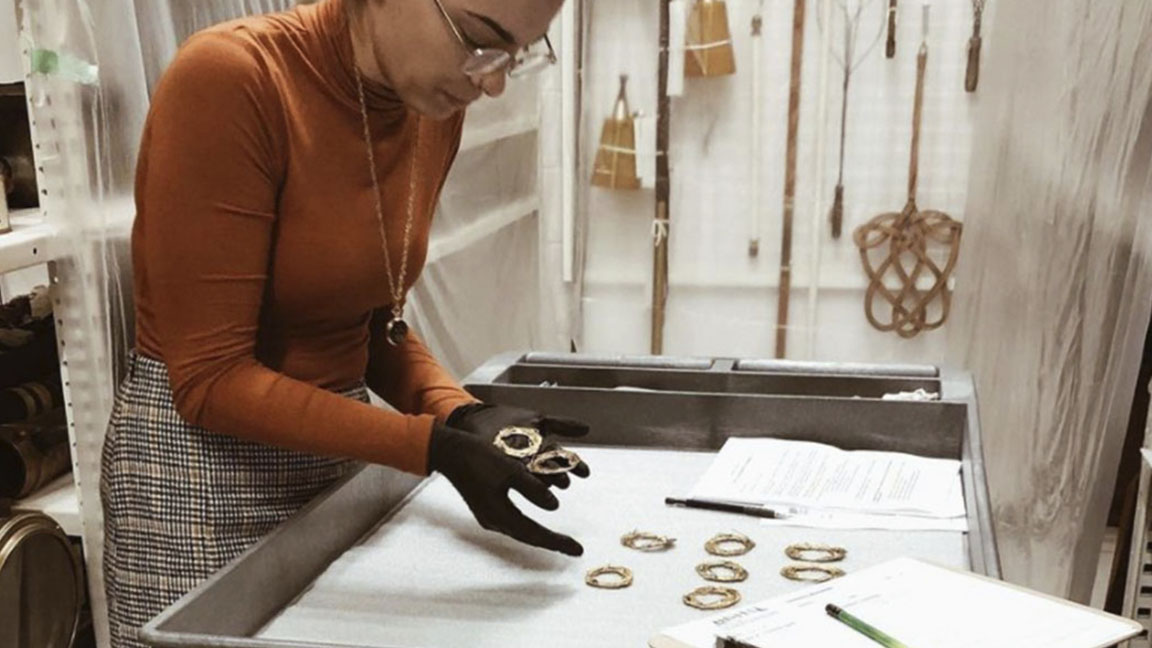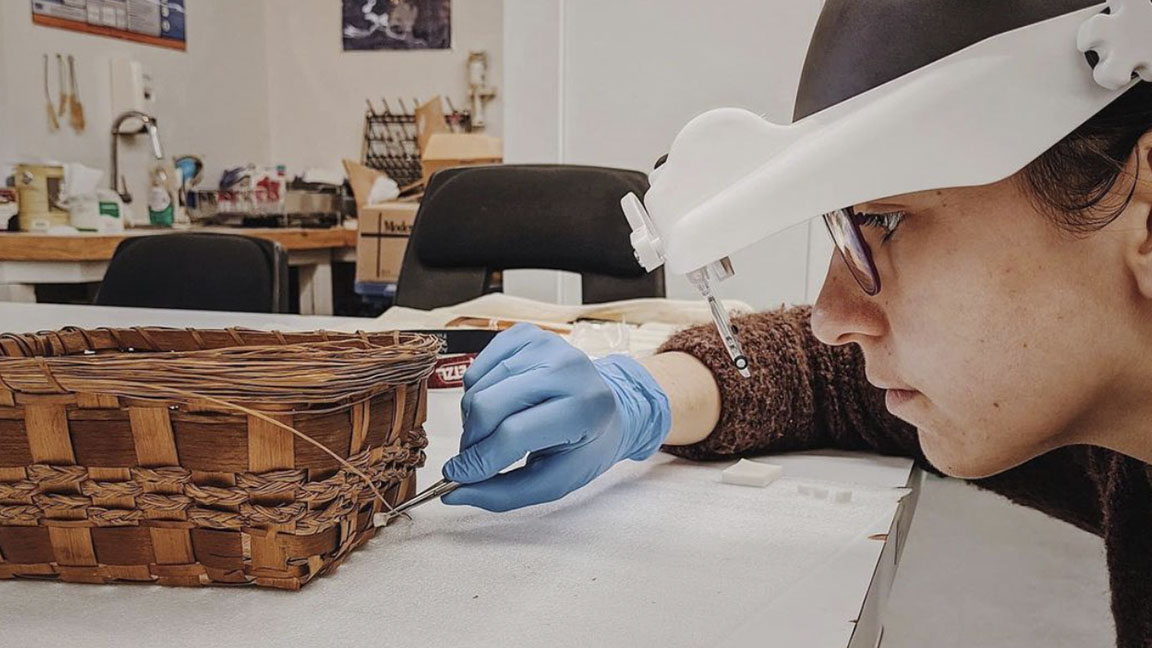Cultural Heritage Conservation and Management
As a Cultural Heritage Conservation and Management specialist, you will learn a wide range of techniques to save the fragile reminders and markers of the past - preserved for future generations to learn from and enjoy.
Program Information
Start Date
September 02, 2025
Domestic Availability
Accepting Applications
International Availability
Closed
CIP Code
30.1202
Program Code
CHM
Delivery
In Person, Placement
Credential
Ontario College Graduate Certificate
Academic School
Location
Program Contact
Domestic Tuition
$3292.16 per semester*
International Tuition
$10565.76 per semester*
Apply Now
Canadian StudentsView Curriculum
September 08, 2026
Domestic Availability
Coming Soon
International Availability
Coming Soon
CIP Code
30.1202
Program Code
CHM
Delivery
In Person, Placement
Credential
Ontario College Graduate Certificate
Academic School
Location
Program Contact
Domestic Tuition
$3292.16 per semester*
International Tuition
$10565.76 per semester*
*Domestic tuition amounts shown are from the 2025-2026 academic year and are subject to change.
*International tuition amounts shown are from the 2025-2026 academic year and are subject to change.
Apply Now
Canadian StudentsView Curriculum
The fundamental role of the conservation professional is to preserve and conserve, as appropriate, cultural property for present and future generations. We have a lot to learn from the experiences and events of people who have gone before us. However, we can't learn much from the past if we don't have records of it. Imagine how much history is lost to us when an ancient artifact is destroyed by perfectly well-meaning people who want to save it.
This two-year Ontario College graduate certificate is an intensive, fast-paced learning experience that you will undertake in four consecutive semesters. You'll start your classes in September and spend your first three semesters, during the fall, winter and summer, at the college. Following your introduction to the field of conservation, you will gain valuable, applied and skills-based experience in the care and handling of most common museum materials, including ceramics, glass, stone, metals, wooden objects, leather and proteinaceous materials, textiles, works of art on paper, books, archival materials, photographs and modern materials. Updated curriculum reflects a focus on hands-on skills, experienced based learning, practical applications, beyond best practices and professional standards rooted in ethical applications. Once you've learned the theory and practical skills, you'll treat museum artifacts from local, regional, and national sites. Complementary courses, workshops, assignments, and community-based projects will offer off campus opportunities to practice conservation methods. A full-time, unpaid, curriculum-based internship in your final semester (September to December) provides an invaluable learning and work experience.
The program has highly skilled and friendly instructors, who gave me a thorough and comprehensive education in the care and conservation of key material types. I had great opportunities to network and work on projects in the field , and that proved to be a great asset once I was looking for employment.
Rachel Nordstrom, Program Graduate - Photographic Collection Manager, Department of Special Collections, University of St. Andrews
Sometimes choosing the right College program can be a daunting task, you want to ensure that you are provided with knowledge and know-how, but also something special that makes you stand out. Choosing the Conservation Program at Fleming College did just that and it was one of the best decisions I ever made!
Tracy Satin, Program Graduate -Director/Curator, Greater Vernon Museum and Archives
The program contributed to getting me here by providing me with the training, skill set and experience (internship) necessary to work in this position. It wasn’t a straight path but an interesting one, and one that I hope continues ahead
Anne Macdonnell, Program Graduate - Paper and Textiles Conservator, Canadian War Museum
As a museum manager, I have found interns and graduates from the Fleming Museum Management and Curatorship and Cultural Heritage Conservation and Management programs to be motivated, skilled and committed to a career in the heritage sector. Following a recent nationwide search for an Assistant Curator/Collections Coordinator, our top two choices out of more than 250 applicants were both Fleming grads.
John Summers, M.M.St., Employer - Manager Heritage Resource Management Planning and Economic Development Tourism and Culture, City of Hamilton
Fleming College's Cultural Heritage Conservation Management program is the only college-level postgraduate training in cultural heritage conservation in Canada. It is widely recognized as providing the optimum synthesis of art and science; graduates are appreciated for their professional ethics and standards, knowledge of sustainable preservation practices, and hands-on experience in the field.
There are many opportunities to get practical experience both at the college and off-campus. In your fourth semester, you will take on a challenging, full-time, unpaid curriculum-based internship at an approved site. Students should be prepared to relocate for the internship, to pay full tuition fees, and be self-supporting during this semester. You will negotiate your own internship with faculty assistance and some students have participated in internships abroad. The internship is an unpaid study experience. Students are responsible for negotiating additional paperwork and funding requirements for international internships including visas, travel and insurance. Every reasonable attempt will be made to fit students to appropriate sites. Students in this program have participated in internships at the following sites:
- Parks Canada - Conservation Laboratories
- Canadian Museum of History
- Peterborough Museum & Archives
- Bata Shoe Museum
- Royal British Columbia Museum
- Royal Alberta Museum
- Historic Royal Palaces
All course work must be successfully completed in order to be eligible for the internship. Satisfactory completion of the internship is a prerequisite for graduation.
In this program you require:
- Respect for tangible and intangible heritage
- A love of history, art, heritage and culture
- Good colour perception and visual acuity
- Outstanding manual dexterity
- Flexibility and organizational skills
- The ability to prioritize tasks and meet multiple demands under pressure
- Cultural sensitivity/awareness
- Proven time management, planning and teamwork skills
- Excellent communication and writing skills
- Experience with digital photography
- An strong interest in the science of art and objects
- A sense of humour
Experience or certification in the following are assets:
- Digital photography
- Photoshop, Adobe Suite
- Ladder Training (required), Fall Arrest Training, or Working at Heights
- French language skills
- Fire Prevention Training
- Firearms Possession and Acquisition Licence (P.A.L.) (to work in military museums and many community museums)
- Experience working with databases
- Smart Serve Food Handling
- Other languages
- Valid driver's licence
- Criminal Reference Check Vulnerable Sector
- AODA Training
Expect to find work in heritage, historical, or cultural organizations and centres, such as archives, museums, historic sites, cultural/heritage institutions, interpretation centres and conservation labs. The employment rate of graduates is very impressive, especially if you are willing to move for work, and take the initiative in developing a network of contacts in the field. Job titles include:
- conservation assistant
- museum assistant
- curatorial assistant
- conservator
- collections care co-ordinator
- museum registrar
- heritage interpreter
- preservation officer
- preparator
You should plan to spend approximately $1,900 on books, supplies, and miscellaneous costs. Students are also required to purchase a few tools, brushes, lab materials and appropriate health and safety equipment. Additional fees may be required for field trips or specialized workshops. A laptop with up-to-date Adobe Creative Suite software and a digital SLR camera are assets.
Students should also consider taking advantage of student rates to join industry professional associations.
If you have a complex medical history, we strongly advise you to discuss your concerns with the program co-ordinator, and to consult with your doctor. You must update Tetanus and all immunizations prior to the start of classes. In addition, students are required to pay certification fees and present current certification for Standard First Aid, CPR (C Level), WHMIS (G.H.S.) and Ladder training and a current Criminal Reference Check Vulnerable Sector Screening. Please provide proof of all documentation at the start of classes in the fall (do not send your documentation ahead of time). Links to mandatory free AODA training will be provided to those who are accepted into the program.
- Adhere to recognized safety practices and professional, legal and ethical standards within the conservation profession.
- Assess, manage and control a museum environment to provide sustainable and optimal care for collections.
- Monitor, protect and maintain artifacts in storage, on display and in transit.
- Assess and complete conservation treatments on a variety of materials and media found in collections using relevant knowledge of physical sciences.
- Collect, research, document, interpret and preserve tangible and intangible heritage using current data collection methods and best practices according to industry standards.
- Provide a rationale and detailed plan for the management and preservation of movable and immovable cultural property (collections and sites).
- Plan, cost, fabricate and install exhibits, display mounts and storage mounts to meet specific needs within a given budget and time frame.
- Apply principles of business and management in non-profit and for-profit heritage conservation sectors.
- Plan and implement sustainable and integrated approaches to risk assessment and preventive conservation for cultural property.
- Create reproductions using a variety of moulding, casting and finishing techniques.
- Use current and relevant terminology to communicate effectively with individuals, families and communities and their associated culture and material history.
- Prepare a portfolio that reflects professional and personal growth, achievements, job readiness, ongoing development and learning.
- Advocate for cultural assets and resources within the confines of economic restraints and other factors affecting the heritage conservation industry.
Students applying to Cultural Heritage Conservation and Management must meet the following requirements:
- Undergraduate degree or Ontario College diploma in a related field or equivalent
- Grade 12 (c ) Chemistry*


